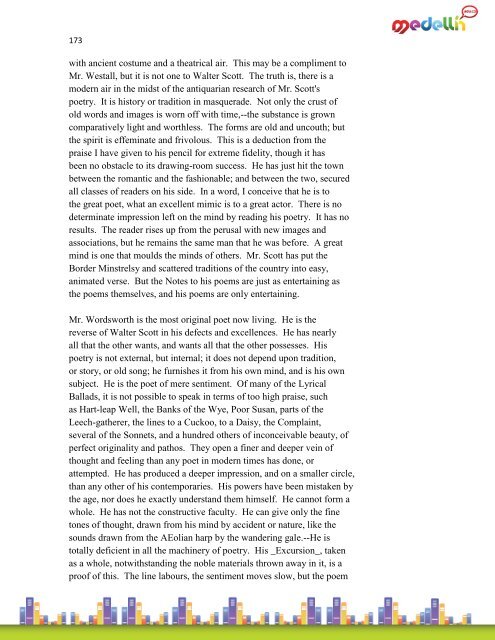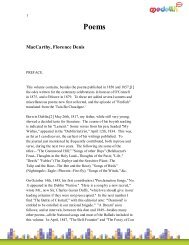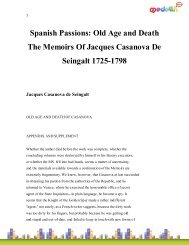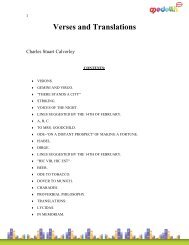Lectures On The English Poets William Hazlitt
Lectures On The English Poets William Hazlitt
Lectures On The English Poets William Hazlitt
Create successful ePaper yourself
Turn your PDF publications into a flip-book with our unique Google optimized e-Paper software.
173<br />
with ancient costume and a theatrical air. This may be a compliment to<br />
Mr. Westall, but it is not one to Walter Scott. <strong>The</strong> truth is, there is a<br />
modern air in the midst of the antiquarian research of Mr. Scott's<br />
poetry. It is history or tradition in masquerade. Not only the crust of<br />
old words and images is worn off with time,--the substance is grown<br />
comparatively light and worthless. <strong>The</strong> forms are old and uncouth; but<br />
the spirit is effeminate and frivolous. This is a deduction from the<br />
praise I have given to his pencil for extreme fidelity, though it has<br />
been no obstacle to its drawing-room success. He has just hit the town<br />
between the romantic and the fashionable; and between the two, secured<br />
all classes of readers on his side. In a word, I conceive that he is to<br />
the great poet, what an excellent mimic is to a great actor. <strong>The</strong>re is no<br />
determinate impression left on the mind by reading his poetry. It has no<br />
results. <strong>The</strong> reader rises up from the perusal with new images and<br />
associations, but he remains the same man that he was before. A great<br />
mind is one that moulds the minds of others. Mr. Scott has put the<br />
Border Minstrelsy and scattered traditions of the country into easy,<br />
animated verse. But the Notes to his poems are just as entertaining as<br />
the poems themselves, and his poems are only entertaining.<br />
Mr. Wordsworth is the most original poet now living. He is the<br />
reverse of Walter Scott in his defects and excellences. He has nearly<br />
all that the other wants, and wants all that the other possesses. His<br />
poetry is not external, but internal; it does not depend upon tradition,<br />
or story, or old song; he furnishes it from his own mind, and is his own<br />
subject. He is the poet of mere sentiment. Of many of the Lyrical<br />
Ballads, it is not possible to speak in terms of too high praise, such<br />
as Hart-leap Well, the Banks of the Wye, Poor Susan, parts of the<br />
Leech-gatherer, the lines to a Cuckoo, to a Daisy, the Complaint,<br />
several of the Sonnets, and a hundred others of inconceivable beauty, of<br />
perfect originality and pathos. <strong>The</strong>y open a finer and deeper vein of<br />
thought and feeling than any poet in modern times has done, or<br />
attempted. He has produced a deeper impression, and on a smaller circle,<br />
than any other of his contemporaries. His powers have been mistaken by<br />
the age, nor does he exactly understand them himself. He cannot form a<br />
whole. He has not the constructive faculty. He can give only the fine<br />
tones of thought, drawn from his mind by accident or nature, like the<br />
sounds drawn from the AEolian harp by the wandering gale.--He is<br />
totally deficient in all the machinery of poetry. His _Excursion_, taken<br />
as a whole, notwithstanding the noble materials thrown away in it, is a<br />
proof of this. <strong>The</strong> line labours, the sentiment moves slow, but the poem

















